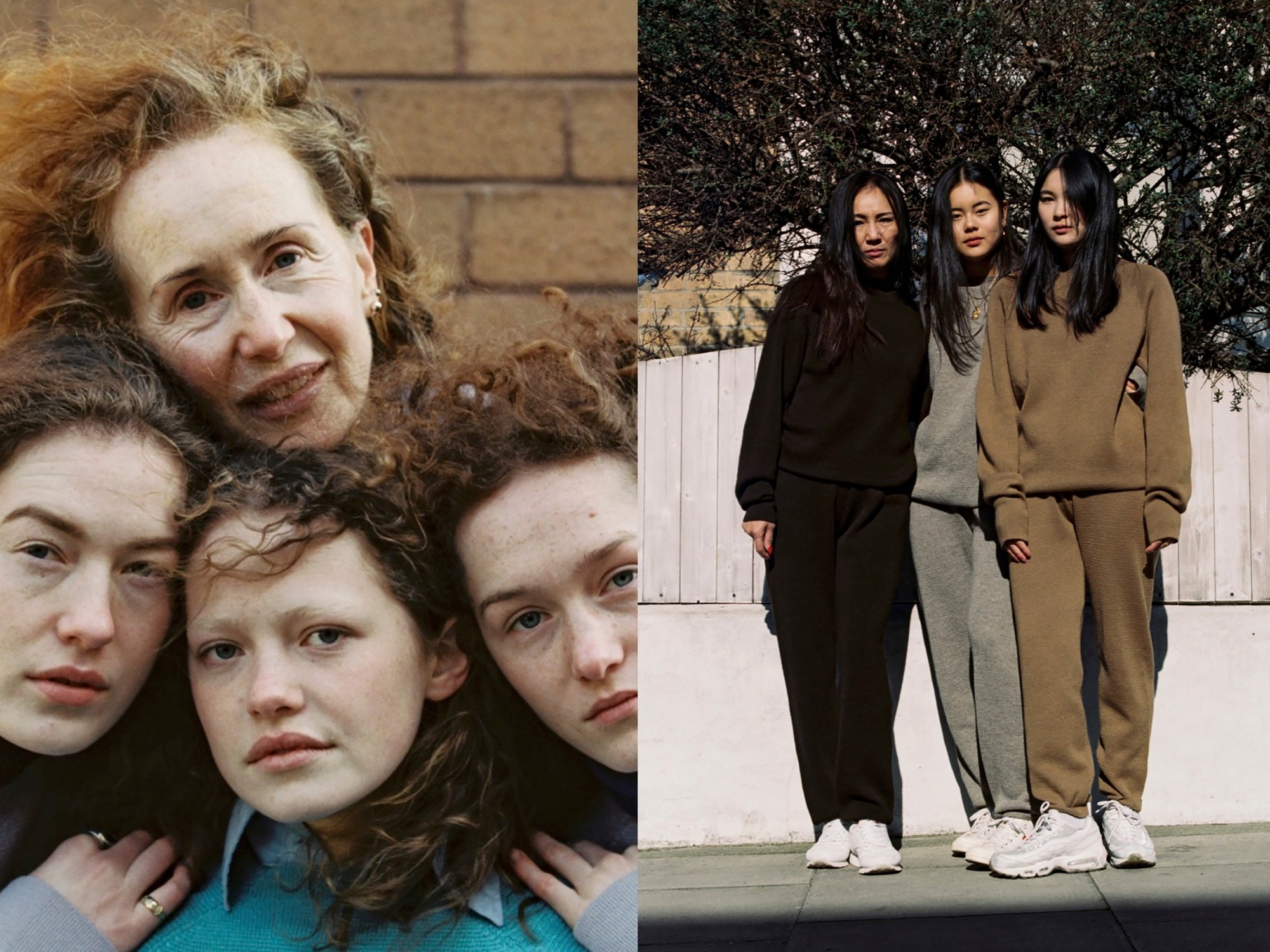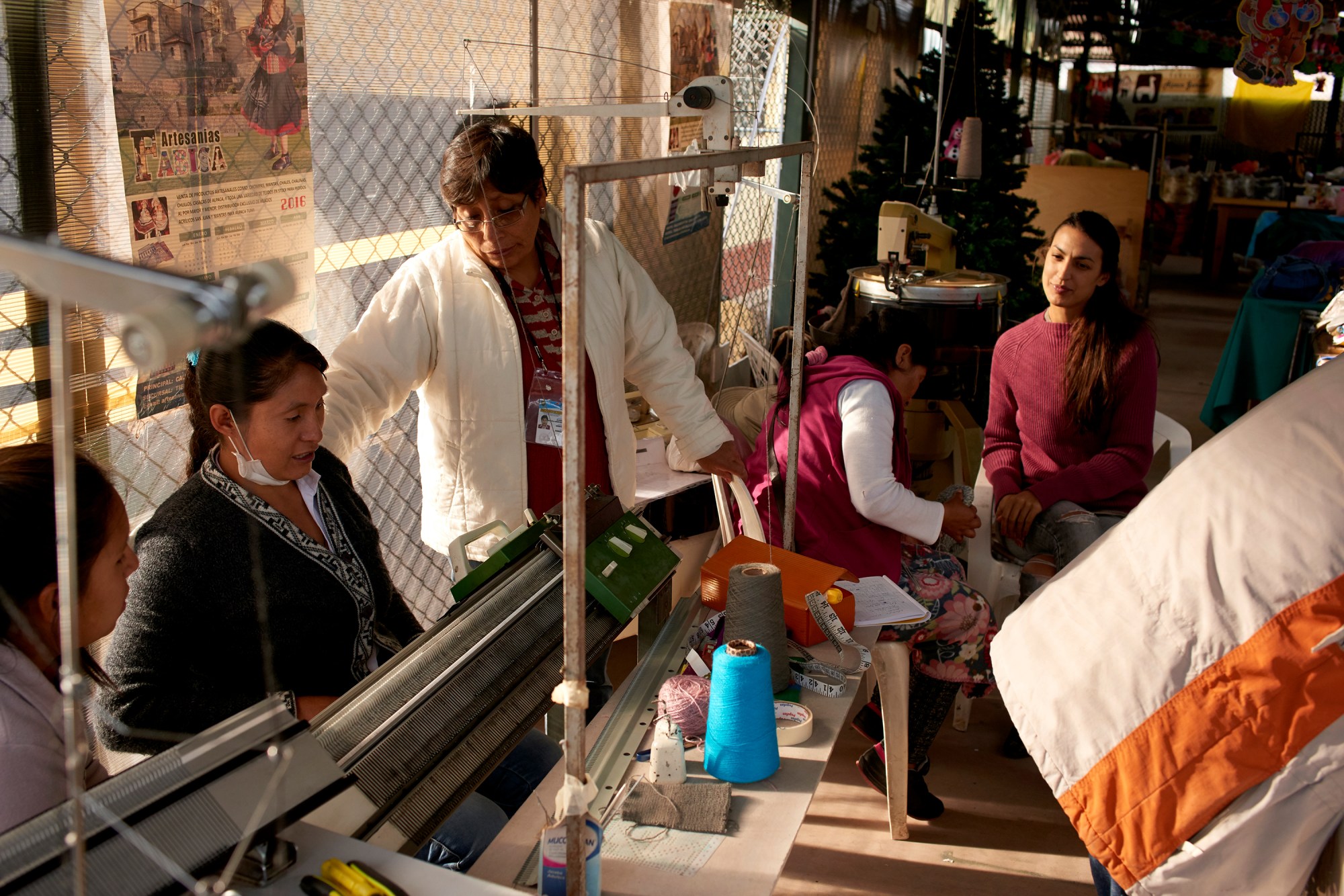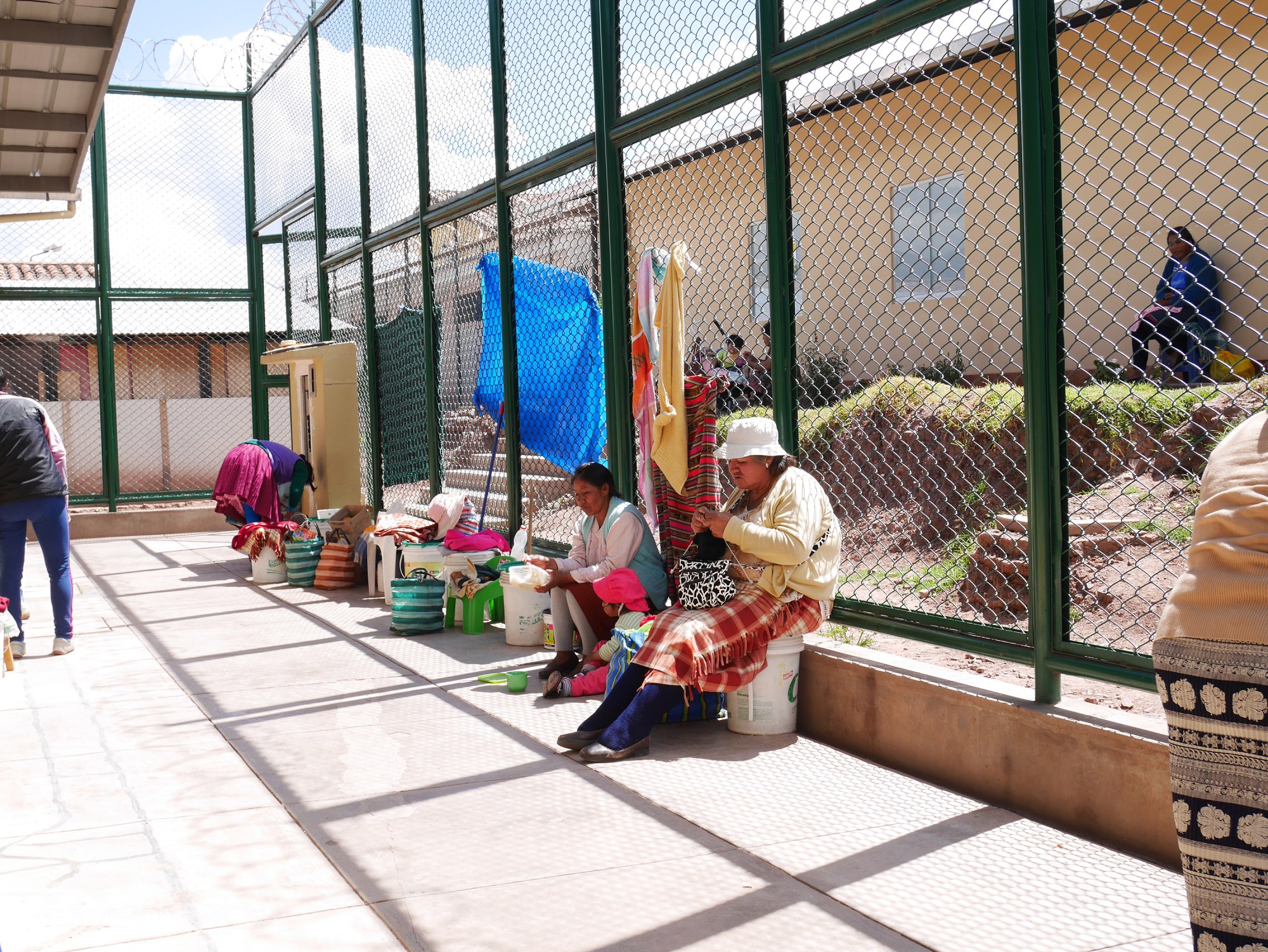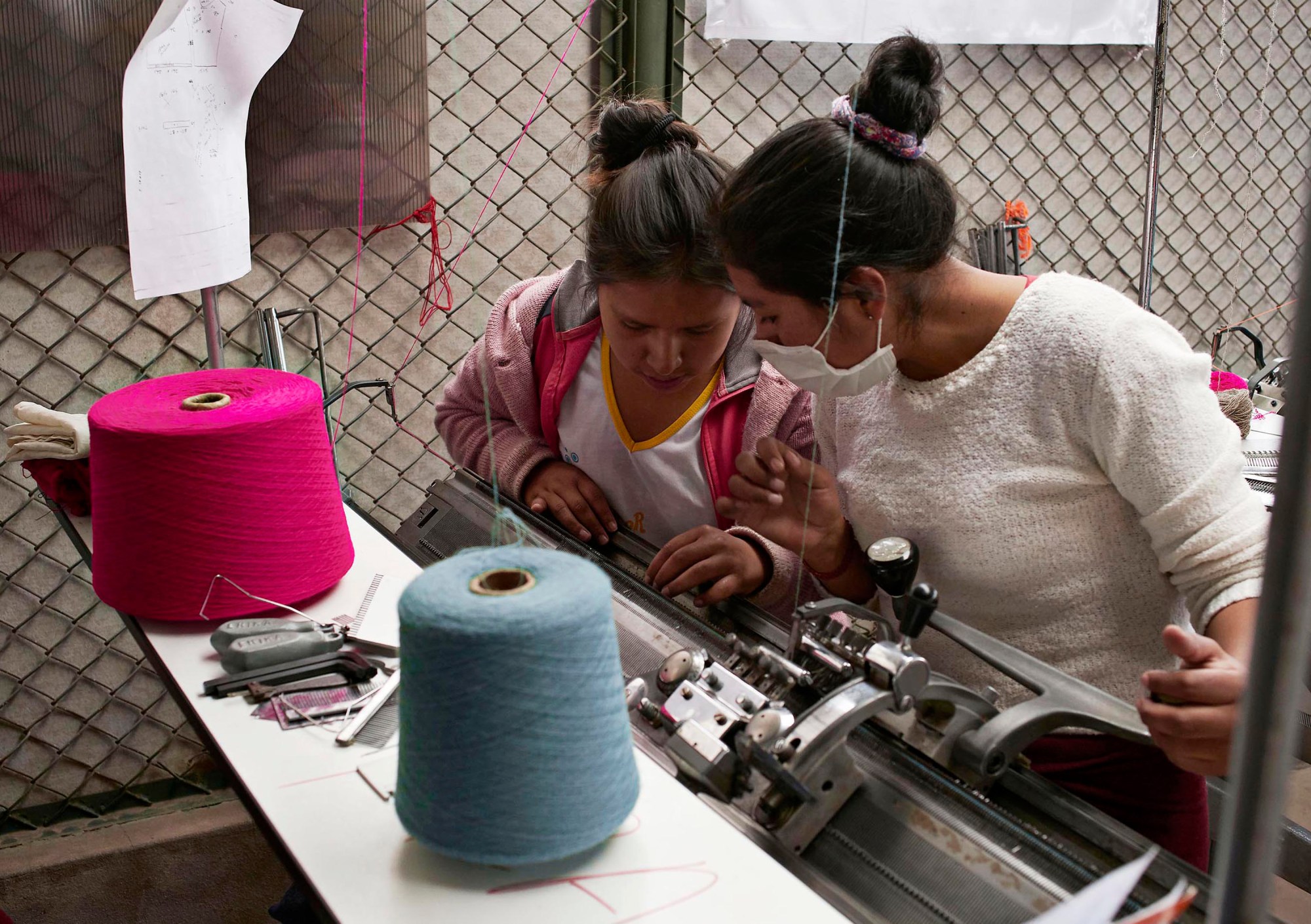Incarcerated women in Peru are turning their lives around by taking on well-paid, high skilled jobs, making fine knit two-piece sets for a label based in Denmark. They’re not just earning wages with which to support their families from the inside, but are gaining much-needed self-worth while learning a trade for when they regain their freedom.
Each garment the women produce for Scandi brand Carcel carries a label with the name of the women who made it, and comes delivered with information about her own story. The women’s words are also published on an online journal — a chance for them to speak to the outside world.
Rocio, 27, is one of the women turning her life around with Carcel, while in a female prison in Cusco — a city high up in the Andes. “I’m really happy with my work. It is now much easier for me to get up in the morning, because I know that there is work waiting for me and I’m really proud to have my own knitting machine,” she says. “I’m much more relaxed since I started working for Carcel.”
With six years left to serve of a 12-year sentence, Rocio has been nicknamed “la major trabajadora”, which means “the best worker”. It seems fitting that she is now making garments for a living, given that she moved to Cusco after finishing high school to work in a clothes store. Here she began a relationship with an older man, who asked her to help drive some more women to the city to work in his shop, who he then put to work as prostitutes. Rocio says she was not aware of this, but was stopped by police and convicted of human trafficking. Her boyfriend disappeared and she never heard from him again.

This hasn’t broken her spirit though. Rocio is saving — using the wages earned from Carcel — to save up for a new beginning when she leaves jail, and dreams of studying tourism and moving to Brazil to live with her father. “It helps me especially to be self-supporting,” she says. “I can take care of myself when it comes to daily expenses in prison and I can even send money to my mum, which makes me feel responsible.”
As well as building a sense of self-worth, the job pays well — to individuals and to the community. Currently, each woman is paid $17 for each item she makes, and on average it’s possible for them to make one to three items per day. This can put the women’s day rate well above the Peru average of around $17 (based on the current national average monthly income of $261). All of the workers are paid directly by the production manager inside the prison, once a month. Of the total amount Carcel then sells the final product for, a third goes to social impact investment: education, and new equipment, for example.
But the job gives Rocio more than just money: she is gaining skills that she can use once she’s left prison, and that’s giving her hope. “I feel very lucky,” she says. “Especially because I’m getting better and better. I learned to knit different kinds of styles and designs and I’ve learned how to change patterns if it is needed with a change in the design. I’m really proud to get experienced working with my machine, to fix problems by myself and to be able to knit all kind of designs, which in the beginning seemed really complicated to me.
“I hope that people feel really comfortable wearing my clothes. And I really hope that they can see that I’m a good person, even if I’ve made a mistake once. Society perceives us as criminals, but I can tell you that most of the women I’m incarcerated with are normal people. I hope that with my work I can show that I’m still part of society and also contribute my part to it.”

Edith, a co-worker and fellow inmate of Rocio’s, agrees that the products she makes could help change perceptions and challenge stereotypes, especially by including her name on the labels. “I hope they think something beautiful about me and I hope that they want to get to know my story and the reason why I’m in prison,” she says. “In prison you are not allowed to speak up for yourself. I hope that my name will, in a way, tell my story and the story of all women, who are incarcerated for a really long time.”
As well as new-found financial independence (she’s able to make phone calls, and send money and occasional gifts to her family on the outside), Edith has a real sense of pride in what she’s doing and her developing skills. “I’m really happy to produce clothes that are sold in foreign countries. Everyday I’m learning a little bit more about knitting and the material,” she says. “Actually everybody — the inmates and the guards — really admire the designs that our workshop is producing. I’m proud to be part in the production of such beautiful designs.”
Also working for Carcel in the prison is Carminia, who wants to travel to Denmark once she’s free: “I’m very proud to work on the industrial machine because it is not so easy to learn knitting on this machine. And I’m especially proud to be working for a foreign company. I hope that one day I can visit the team in Denmark.”
Elena, another knitter, is now able to send presents to her daughter, bought with her wages. She shares Carminia’s sense of pride in her work, and the notion that the pieces she produces can say something about her to the outside world. “I’m proud about my progress and how much I’ve learned. In the beginning it was very difficult to get myself disciplined. I was not used to making things 100%. In the workshop the knitted patterns need to have the exact measurements, so I need to be really focused. I’m proud that I’m now able to make clothes that are perfect. But it took me a lot of practice. I sweated a lot.

“I hope that the clothes with my name on them will show people that not everything in prison is bad. And I of course hope that they think something beautiful about me as a person,” she laughs.
Beautiful design is at the centre of the women’s work. Carcel was founded in late 2016, after founder Veronica D’Souza visited a women’s prison in Nairobi. “The first thing that struck me was that these women were there because of poverty,” she says. “Basically, they were trying to make money to provide for their children through trafficking drugs, prostitution, theft and other non-violent crimes. And they got really long sentences, leaving them and their families even poorer than before. And for most in society, they were invisible. It felt unfair.”
Veronica was shown the women’s workspace, where they spent a lot of time making craft pieces to sell in the prison shop, open to visitors. She noticed that despite being given space and time to work, the women did not have access to quality materials or any guidance or help when it came to design, so they didn’t make any money for the pieces they were able to produce.
She decided to create a company that could change that, and employ women in prison in order to give them new skills, fair jobs and help them and their children break the poverty chain. “Some of the countries that have the highest rate of poverty-related crime for women also have some of the world’s most exclusive and sustainable materials.” Veronica did some research and discovered that in Peru, “70% of women are incarcerated for trafficking cocaine”. According to the latest figures, women make up 5.7% of the current Peruvian prison population of 85,621. The rate of people being incarcerated in the country has increased dramatically in recent years: up from 43,286 in 2008, and 27,734 in 2000.
Peru has a long tradition of using a sustainable, hard wearing and beautiful material produced in the country — alpaca wool — so it seemed like a good place to start the project. Veronica spent a month there, visiting jails and getting to know the prison system, as well as learning how to build an organisation on the inside. She chose to start operations in a prison in the city of Cusco, high up in the Andes mountains: it’s where alpaca comes from, and many of the women there are already knitters.

Now Carcel has established a production inside the women’s prison in Cusco and is selling knitwear to customers all over the world. The team’s Production Manager, Meike, is based in the city and works in the prison on a daily basis, managing operations closely and monitoring how the women are doing.
“I am really proud of the women we work with,” says Veronica. “They’ve become extremely skilled and they are truly wonderful people. We have seen a great positive change in their mood, self-esteem and motivation since we started. Having a job makes such a difference.
“They come from across the country and when they get out, most will travel back to be with their families. So being able to buy your own knitting machine and knowing how to make quality products gives them a way to make money when they get out. All of this helps create dignity and conditions that inspires dreams and hope for the future, which is essential for building a new life on the outside.”
But the project isn’t about just making clothes for the sake of it: these are carefully designed pieces, and the label’s creative team reflects that. Creative director Louise van Hauen has an MA from the Royal College of Art in London and has worked with fashion houses like Louis Vuitton and Dirk Bikkembergs. Specialists are assigned to different materials: Line Josefsen is Carcel’s knitwear expert and Tine Tourell is working on future designs in natural silk.

The label’s pieces combine elegant details with casual shapes. “There is definitely inspiration drawn from streetwear and I think this is something that we’ll continue to do,” says Louise. “The Milano sweater for instance, is based on an old 80s sweatshirt that (in my view) has just that perfect classic cut, whereas the finishing details and the knitting techniques are more traditional high-end.
“We’re definitely kids of Copenhagen with a down-to-earth approach to premium materials — we want to make products that you’ll want to wear both on a night out and a lazy day in.”
The use of Peruvian alpaca wool for production in Cusco serves a dual purpose: it is sourced in the Andes — the same mountains where the prison is located — so provides Carcel with a low carbon-footprint material with which to make its clothes. The wool also is perfect for comfortable, great-looking pieces: “It’s naturally temperature regulating and sensitive to your skin,” says Louise.
The use of local, natural materials is something the team is planning to replicate soon, producing pieces in 100% silk with women in a Thai prison. Carcel has just signed a partnership agreement with the Thai Ministry of Justice: it will be the first international company ever to produce in prisons in Thailand. They will start training in May at a women’s prison in Chiang Mai — a city in the mountains of northern Thailand — using 100% locally-made silk. “We will be the first international company entering Thai prisons,” says Veronica. “I’m really looking forward to building an ethical workplace that gives fair wages and new skills to the women there.“
Ethical workplaces, fair wages and new skills are wanted by women the world over, but for those in jail, jobs like this mean something even deeper. As Carminia in Cusco says: “I hope that when people see my name in their clothes, they can see that I haven’t given up and that I’m strong. I won’t lose my hope even if I’m here in prison.”
